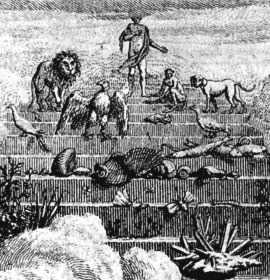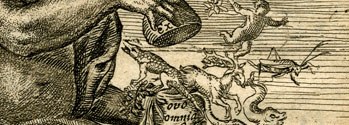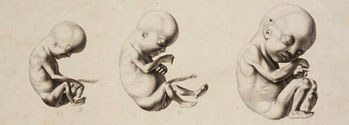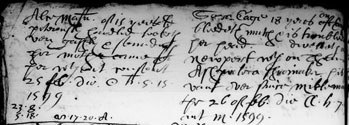A one-day workshop held in the Department of History and Philosophy of Science, University of Cambridge on Tuesday 16 January 2007, 10.00–6.00
 Why engage today with Arthur O. Lovejoy's The Great Chain of Being (1936)? Not, surely, to revive the history of ideas for which this book was the manifesto, but, for this workshop, as a starting point, stimulating as well as obligatory, from which to reconsider the history of seriality in the sciences. Re-reading is above all an opportunity to reflect on the influential thesis of Lovejoy's last chapters, that the eighteenth century witnessed the profound transformation of a static scale of beings into a ladder of progress, an inventory into a developmental programme. Seventy years since Lovejoy's book, and over 30 since William F. Bynum's appraisal in the journal History of Science, we invite colleagues to revisit this historical problem in the light of recent scholarship. How, now that historians of science are more at home with practices and pictures than unit-ideas, might we best describe and explain the new kinds of seriality of the decades around 1800?
Why engage today with Arthur O. Lovejoy's The Great Chain of Being (1936)? Not, surely, to revive the history of ideas for which this book was the manifesto, but, for this workshop, as a starting point, stimulating as well as obligatory, from which to reconsider the history of seriality in the sciences. Re-reading is above all an opportunity to reflect on the influential thesis of Lovejoy's last chapters, that the eighteenth century witnessed the profound transformation of a static scale of beings into a ladder of progress, an inventory into a developmental programme. Seventy years since Lovejoy's book, and over 30 since William F. Bynum's appraisal in the journal History of Science, we invite colleagues to revisit this historical problem in the light of recent scholarship. How, now that historians of science are more at home with practices and pictures than unit-ideas, might we best describe and explain the new kinds of seriality of the decades around 1800?
Attendees will be expected to have studied Lovejoy's book, especially the last three chapters, and it would be very helpful also to have read Bynum's 'The great chain of being after 40 years: an appraisal', History of Science 13 (1975), 1–28.
Organised by Nick Hopwood, Jim Secord and Simon Schaffer
Assistant: Melanie Keene
Funded by the Wellcome Trust and the Cambridge Victorian Studies Group
Programme
Simon Schaffer (HPS)
Lovejoy's chain
Discussion of Lovejoy's book, especially the last three chapters, introduced with commentaries by Marie-Noëlle Bourguet and Nicolaas Rupke
Carlos López Beltrán (UNAM, Mexico City)
Hereditary tales: contingency and narrativity versus the chain of being
Staffan Müller-Wille (University of Exeter)
How the great chain of being fell apart
Renato Mazzolini (University of Trento)
Human skin colour and the chain of being
Janina Wellmann (MPIWG, Berlin)
Life as a series: the embryological work of Christian Pander and Karl Ernst von Baer
Joan Steigerwald (York University, Toronto)
Inversions of the chain of being: Schelling and Ritter
Martin Rudwick (HPS)
Testing the temporalized chain against real (deep) time



